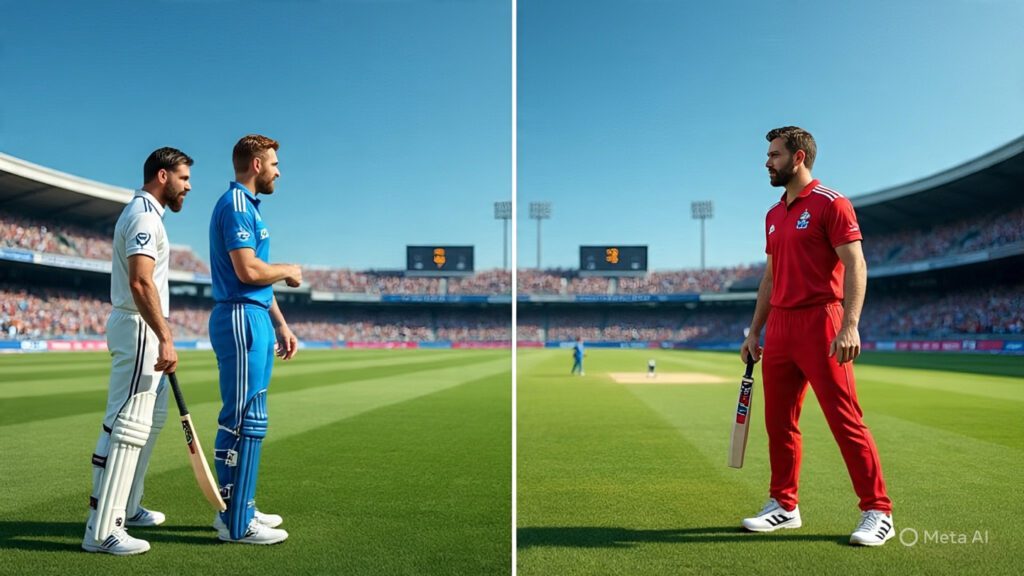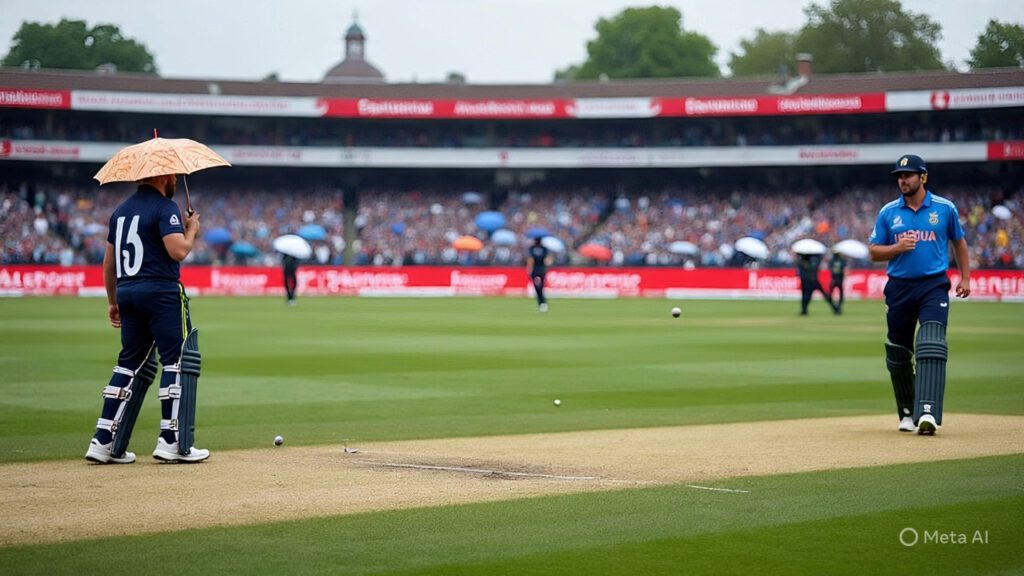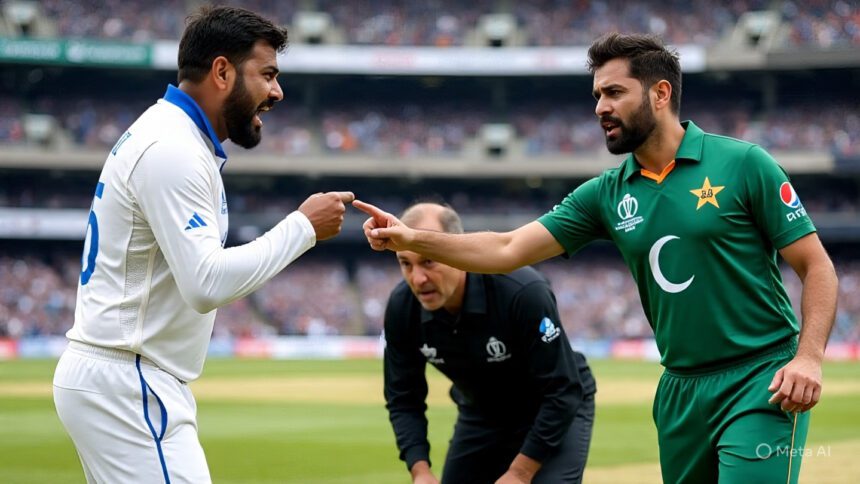Introduction:”time-wasting tactics”
While Indian players vocally protested England’s time-wasting tactics,time-wasting tactics, bowling coach Tim Southee reminded critics that India had also resorted to similar antics earlier in the match—dismissing the complaints as unfounded.
Tensions Boil Over at Lord’s in Dramatic Finale
With just five minutes remaining in the day’s play, England’s openers Zak Crawley and Ben Duckett walked out to bat, facing what should have been two overs from India’s fast attack.time-wasting tactics, However, what followed was a calculated display of delay tactics that saw only a single over bowled before stumps, much to the frustration of India’s fielders.
The delay ensured the day’s play ended with just that one over, time-wasting tactics,denying India a valuable opportunity to press for a late wicket.
India’s captain Shubman Gill was visibly irate, yelling an expletive at Crawley and making aggressive gestures toward him. time-wasting tactics,Duckett intervened, and the verbal confrontation escalated as players exchanged sharp words before leaving the field.

Southee: “India Complained Despite Doing the Same”
England bowling consultant and former New Zealand pacer Tim Southee was quick to address the controversy in a post-match interview,time-wasting tactics, defending England’s tactics and pointing fingers back at India.
“It’s always exciting when emotions are high toward the end of the day,” Southee remarked. “But I’m not sure what they were complaining about. time-wasting tactics,That’s also time-wasting.”
Southee emphasized that time management and strategic pauses are part of Test cricket’s psychological battle,time-wasting tactics, especially when tensions run high.
Crawley’s Tactics Frustrate India
The over in question began two minutes behind schedule, and Crawley was in no rush. After carefully leaving the first ball, time-wasting tactics,he paused several times before the third delivery, leading to visible frustration from Bumrah and animated reactions from India’s fielders.
When Crawley finally took a hit on the glove, England’s physio was called onto the field, drawing mixed reactions from the crowd. time-wasting tactics,The delay consumed the rest of the available time, and Crawley walked off after the over without facing another ball.
Sky Sports was forced to issue an apology after Gill’s heated exchange with Crawley was caught on the broadcast, time-wasting tactics,with some of the language deemed inappropriate for viewers.

Heated Words and Gestures on the Field
After Crawley was struck and called for treatment, time-wasting tactics,Gill sarcastically applauded the act before rushing toward him and making an “X” sign with his arms. Crawley responded by wagging his finger, prompting Duckett to intervene and defend his teammate.
Even as the teams left the field, tensions remained high. time-wasting tactics,Indian players hurled more words at Duckett and Crawley, showing how much was riding on every moment of this crucial Test match.
KL Rahul: “We Were Hoping for One Breakthrough”
“Obviously, we wanted to bowl two overs.time-wasting tactics, With six minutes left, that’s the standard expectation,” said Rahul. “It’s tough for any batter to come in and survive two overs at the end of a long day in the field. We were pumped, hoping to grab at least one breakthrough before stumps.”
He added that such situations can make or break a match, especially in closely contested series like this one, which is tied 1-1.
A Match Full of Stoppages and Strategy
On day two, Gill himself received a lengthy massage on the field for what was reported to be a back spasm, halting play for several minutes.
Both teams have used various tactics to slow down or manipulate the tempo of the match depending on the situation—something not uncommon in Test cricket,time-wasting tactics, where mind games often play a pivotal role in momentum shifts.

Michael Vaughan: “India Can’t Complain”
Former England captain Michael Vaughan chimed in during the Test Match Special podcast, echoing Southee’s comments. “But India have no reason to complain—they’ve done the same.”
He pointed out how Gill’s back treatment and KL Rahul’s off-field break had disrupted play,time-wasting tactics, highlighting that both sides had used the clock to their advantage at different points in the match.
“Neither side is innocent. But what drama—this is what makes Test cricket thrilling,” Vaughan added.
Alastair Cook: “The Drama Was Needed”
Sir Alastair Cook, another former England skipper, felt the drama brought much-needed intensity to the series.
“This series started off friendly, with both teams showing mutual respect,” Cook explained. time-wasting tactics,“But with a five-match series, these moments are inevitable. Players start getting on each other’s nerves.”
He humorously compared Duckett to a dachshund, referring to the moment he squared up to India’s Mohammed Siraj. “He might be the smallest on the field, time-wasting tactics,but he wasn’t backing down,” Cook said with a grin.
What’s at Stake Going Forward
With the scores level after the first innings and England ending day three at 2-0, they now hold a slim lead heading into the fourth day.time-wasting tactics, But more than just runs, it’s clear that emotions, pride, and psychological momentum are now part of the equation.
Both sides have shown that they’re willing to push the boundaries of gamesmanship. With two days remaining and the series hanging in the balance, time-wasting tactics,fans can expect even more drama, confrontations, and tactical masterstrokes as this intense rivalry continues to unfold.
Conclusion: Cricket’s Drama Is Far From Over
Time-wasting is a grey area in cricket—sometimes frowned upon, sometimes praised as clever tactics. In this case, time-wasting tactics,both India and England have used it when it suited them, and the drama it has sparked only adds to the intrigue of this gripping Test series.
As we move into days four and five, the focus will shift back to runs and wickets, but the memory of this high-octane finish to day three will linger. Whether or not a final result goes England or India’s way, this match will be remembered for the passion, the tension—and the controversy that reminded us why Test cricket remains the sport’s ultimate test.
✅ Positive Aspects (In Favor of England / Time-Wasting as Strategy)
time-wasting tactics,
1. Strategic Gameplay
- Time-wasting can be part of a broader tactical approach.
- Teams often manage the clock to reduce risk before a break or stumps.
2. Psychological Pressure
- Delays frustrate bowlers and fielding sides, shifting mental advantage.
- Used effectively, it can unsettle aggressive opposition strategies.
3. Tit-for-Tat Justification
- If one team (India) does it earlier, the other team (England) has a fair right to do the same.
- Creates a level playing field in terms of gamesmanship.
4. Part of Test Match Dynamics
- In five-day cricket, such tactics are not illegal and are often seen as “grey area” strategy.
- Historically used in crucial final overs or when defending a draw.
5. Player Safety Justification
- Crawley calling for physio could be seen as a legitimate safety concern, not just time-wasting.
- Fielders or batters have a right to treatment if injured.

❌ Negative Aspects (In Favor of India / Against Time-Wasting)
time-wasting tactics,
1. Unsportsmanlike Behavior
- Purposefully delaying the game violates the spirit of cricket.
- It shows a lack of respect for the opposition and the audience.
2. Unfair Denial of Opportunity
- India was denied a second over that could have shifted momentum.
- Can affect the outcome of the match unfairly.
3. Contradiction to Fair Play Values
- Cricket prides itself on being a “gentleman’s game”—manipulating time contradicts that.
- Fans and experts often criticize such tactics as cheating in disguise.
4. Triggers On-Field Conflict
- Tensions escalate unnecessarily, affecting match spirit.
5. Damages Team Image
- England’s actions might damage their global sportsmanship reputation.
- Similar acts have in the past led to disciplinary actions or public backlash.
⚖️ Neutral or Contextual Aspects
| Context | Positive If… | Negative If… |
|---|---|---|
| Injury delays (e.g., Crawley’s finger) | Legitimate concern for health | If faked or exaggerated, seen as unethical |
| Tit-for-tat responses | Balances fairness between teams | Two wrongs don’t make a right |
| Last-over time management | Smart captaincy and control | Robs viewers of exciting cricket moments |
